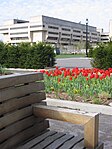University of Pittsburgh School of Education
The University of Pittsburgh School of Education consists of five academic departments: Administrative and Policy Studies, Health and Physical Activity, Instruction and Learning, Learning Sciences & Policy, and Psychology in Education. The school is primarily located in Wesley W. Posvar Hall although the school has facilities in the Petersen Events Center, Trees Hall, the Learning Research and Development Center, Falk School, and other locations.[1] As of the 2016-2017 academic year, the student body consisted of over 1,200 students with nearly 1,000 among the over 50 graduate programs.[2] The school is currently ranked 27th in graduate education according to U.S. News & World Report. As of 2017, over $26 million in funded research was undertaken in the school.[3]
Excerpt from the Wikipedia article University of Pittsburgh School of Education (License: CC BY-SA 3.0, Authors).University of Pittsburgh School of Education
South Bouquet Street, Pittsburgh
Geographical coordinates (GPS) Address Nearby Places Show on map
Geographical coordinates (GPS)
| Latitude | Longitude |
|---|---|
| N 40.441638888889 ° | E -79.953805555556 ° |
Address
Wesley W. Posvar Hall
South Bouquet Street 230
15213 Pittsburgh
Pennsylvania, United States
Open on Google Maps








